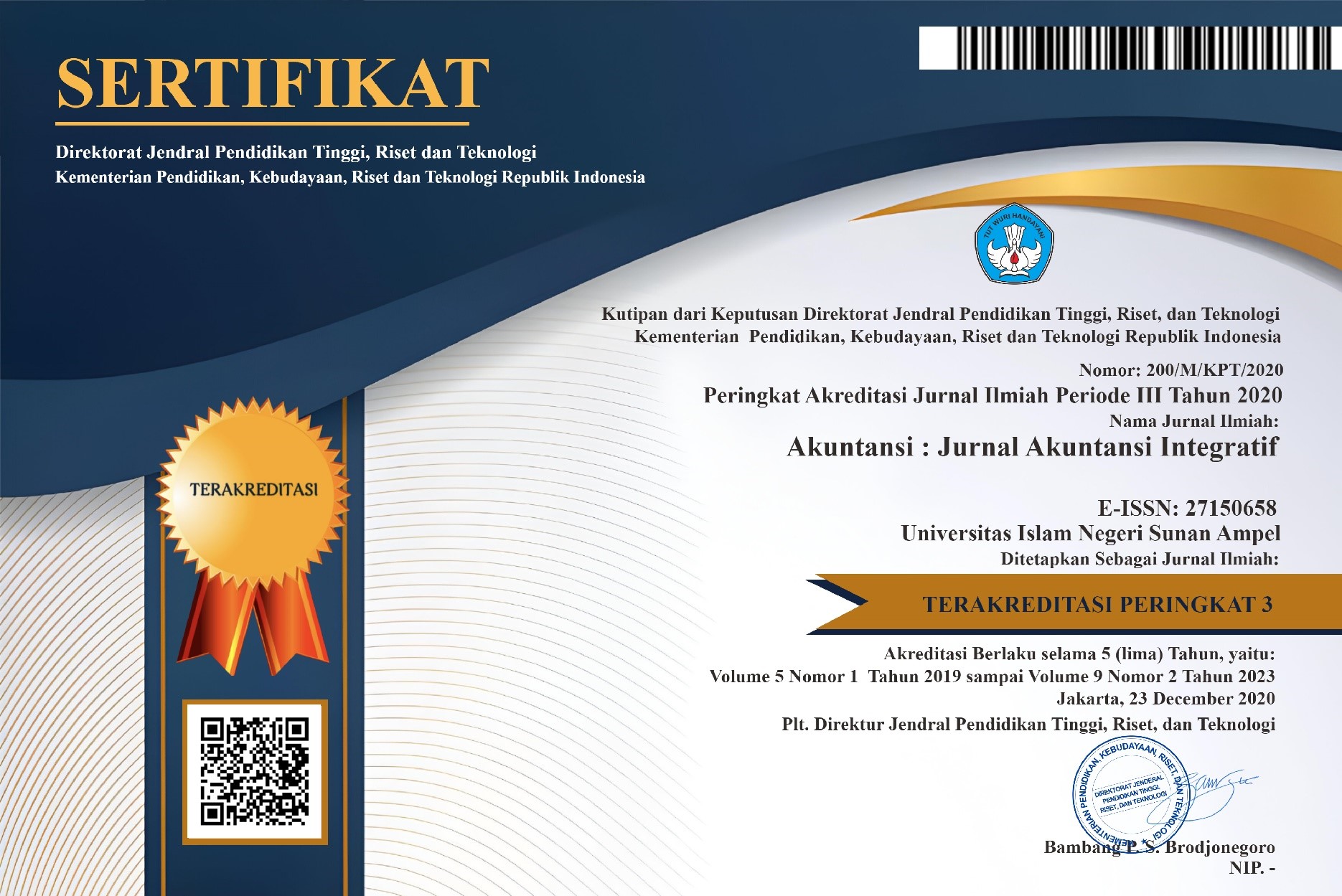Foreign Ownership dan Earnings Management pada Perbankan Asean
DOI:
https://doi.org/10.29080/jai.v9i2.1455Keywords:
Corruption Perception Index (CPI), Earning Management Quality, Foreign OwnershipAbstract
This research aims to examine the influence of foreign ownership on the earnings management of banking companies in the ASEAN region. The population is banking companies listed on the Stock Exchanges of four ASEAN countries: Indonesia, Malaysia, the Philippines and Thailand. We took 430 companies as samples for this research from these countries. This research took 5 (five) years. The results of the study found that foreign ownership has a negative relationship with earnings management because foreign ownership can reduce management actions to carry out earnings management; Foreign-owned banking companies have higher earnings quality in the first five years, and foreign investors' home countries that have a high CPI also have higher earnings quality. This research, based on the findings, can state that foreign investors can improve the effectiveness of governance and maintain earnings management.
Downloads
References
Adnantara, K. F. 2013. “Pengaruh Struktur Kepemilikan Saham Dan Corporate Social Responsibility Pada Nilai Perusahaan.” Jurnal Buletin Studi Ekonomi 18, pp. 107–13.
Aggarwal, R., Erel, I., Ferreira, M., & Matos, P. (2011). Does governance travel around the world? Evidence from institutional investors. Journal of Financial Economics, 100, pp. 154–181.
Albuquerque, R., Bauer, G. H., & Schneider, M. (2009). Global private information in international equity markets. Journal of Financial Economics, 94(1), pp. 18–46.
Ayres, F. L. (1994). Perception of Earnings Quality: What Managers Need To Know. Making The Bottom Line Look Better May Have a Negative Result. Management Accounting, 75 (9), pp. 27-29.
Badertscher, B. A., J. D. Phillips, M. Pincus, and S. O. Rego, 2009, Evidence on motivations for downward earnings management. (http://doi.org/10.2139/ssrn.921422).
Bao, S. R., & Lewellyn, K. B. (2017). Ownership structure and earnings management in emerging markets—an institutionalized agency perspective. International Business Review, 26(5), pp. 828–838.
Beatty, A., S. L. Chamberlain, & J. Magliolo. (1995). Managing Financial Reports of Commercial Banks: The Influence of Taxes, Regulatory Capital and Earnings. Journal of Accounting Research 33 (2), pp. 231-261.
Beatty, A., Ke, B., & Petroni, K. R., (2002). Earnings Managementto Avoid Earnings Declines Across publicly and Privately Held Banks. The Accounting Review 77 (3), pp. 547-570.
Bratten, B., M. Cusholli, & L. A. Mayers. (2013). Fair Value Accounting, Auditor Specialization, and Earnings Management: Evidence from the banking Industry. Working Paper, University of Kentucky, KY.
Beuselinck, C., Blanco, B., & García Lara, J. M. (2017). The role of foreign shareholders in disciplining financial reporting. Journal of Business Finance & Accounting, 44 (5–6), pp. 558–592.
Chen, L., Han, M., Li, Y., Megginson, W. L., & Zhang, H. (2021). Foreign ownership and corporate excess perks. Journal of International Business Studies (in press).
Cheng, Q., T. Warfield, and M. Ye, 2011, Equity incentives and earnings management: Evidence from the banking industry, Journal of Accounting, Auditing & Finance 26, pp. 317–49.
Chung, R., Firth, M., & Kim, J. B. (2002). Institutional monitoring and opportunistic earnings management. Journal of Corporate Finance, 8(1), pp. 29–48
Chung, R., Ho, S., & Kim, J. B. (2004). Ownership structure and the pricing of discretionary accruals in Japan. Journal of International Accounting, Auditing and Taxation, 13, pp. 1–20.
Elyasiani, E., Y, Wen., & Zhang, R. (2017). Institutional ownership and Earnings Management By
Bank Holding Companies. The Journal of Financial Research, XL(2), pp. 147– 178.
Fang, V. W., Maffett, M., & Zhang, B. (2015). Foreign institutional ownership and the global convergence of financial reporting practices. Journal of Accounting Research, 53(3), 593–631.
Ferreira, M., and P. Matos. 2008. The colors of investors’ money: The role of institutional investors around the world. Journal of Financial Economics 88: pp. 499-513.
Firth, M., Fung, P. M. Y., & Rui, O. M. (2007). Ownership, two-tier board structure, and the informativeness of earnings - evidence from China. Journal of Accounting and Public Policy, 26, pp. 463–496.
Flannery, M. J., S. H. Kwan, and M. Nimalendran, 2004, Market evidence on the opaqueness of banking firms’assets, Journal of Financial Economics 71, pp. 419–60.
Freeman, R. E. (1984). Strategic Management. A Stakeholder Approach. (Pitman/Ballinger, Harper Collins, Boston).
García-Meca, E., & Sanchez-Ballesta, ´ J. P. (2009). Corporate governance and earnings management: A meta-analysis. Corporate Governance: An International Review, 17 (5), pp. 594–610.
Ghozali, I dan A. Chariri. 2007. Teori Akuntansi. Badan Penerbit Universitas Diponegoro: Semarang
Giannetti, M., & Laeven, L. (2009). Pension reform, ownership structure, and corporate governance: Evidence from a natural experiment. Review of Financial Studies, 22(10), 4091–4127
Guo, J., Huang, P., Zhang, Y., & Zhou, N. (2015). Foreign ownership and real earnings management: Evidence from Japan. Journal of International Accounting Research, 14(2), pp. 185–213.
Guo, F., & Ma, S. (2015). Ownership characteristics and earnings management in China. The Chinese Economy, 48(5),pp. 372–395.
Guo, M., & Zheng, C. (2021). Foreign ownership and corporate social responsibility: Evidence from China. Sustainability, 13(2), pp. 1–22.
Hanafi, M., & A. Halim. (2003). Analisa Laporan Keuangan, Yogyakarta: UPP AMP YKPN.
Han, M., Ding, A., & Zhang, H. (2022). Foreign ownership and earning management. International Review of Economics and Finance, 80, pp. 114–133.
Healy, P. M., & Wahlen, J. M. (1999). A review of the earnings management literature and its implications for standard setting. Accounting Horizons, 13(4), pp. 365–383.
Huang, W., & Zhu, T. (2015). Foreign institutional investors and corporate governance in emerging markets: Evidence of a split-share structure reform in China. Journal of Corporate Finance, 32, pp. 312–326.
Hutzschenreuter, T., Kleindienst, I., & Lange, S. (2016). The concept of distance in international business research : A review and research agenda, 18, pp. 160–179.
Javeed, S. A., & Lefen, L. (2019). An Analysis of Corporate Social Responsibility and Firm Performance with Moderating Effects of CEO Power and Ownership Structure: A Case Study of the Manufacturing Sector of Pakistan. Sustainability. (11), pp. 248.
Jensen, M. C., and W. H. Meckling, 1976, Theory of the firm: Managerial behavior, agency costs and ownership structure, Journal of Financial Economics 3, 305–60.
Kang, J. K., & Kim, J. M. (2010). Do foreign investors exhibit a corporate governance disadvantage an information asymmetry perspective. Journal of International Business Studies, 41(8), 1415–1438.
Kho, B. C., Stulz, R. M., & Warnock, F. E. (2009). Financial globalization, governance, and the evolution of the home bias. Journal of Accounting Research, 47(2), pp. 597–635.
Kim, J. B., Pevzner, M., & Xin, X. (2019). Foreign institutional ownership and auditor choice: Evidence from worldwide institutional ownership. Journal of International Business Studies, 50, 83–110.
Kim, I., Miller, S., Wan, H., & Wang, B. (2016). Drivers behind the monitoring effectiveness of global institutional investors: Evidence from earnings management. Journal of Corporate Finance, 40, pp. 24–46.
Lai, L., & Tam, H. (2017). Corporate governance, ownership structure and managing earnings to meet critical thresholds among Chinese listed firms. Review of Quantitative Finance and Accounting, 48, 789–818.
Lel, U. (2019). The role of foreign institutional investors in restraining earnings management activities across countries. Journal of International Business Studies, 50, pp. 895–922
Leuz, C., Nanda, D., & Wysocki, P. D. (2003). Earnings management and investor protection: An international comparison. Journal of Financial Economics, 69, 505–527.
Li, S., Selover, D. D., & Stein, M. (2011). Keep silent and make money: Institutional patterns of earnings management in China. Journal of Asian Economics, 22(5), 369–382.
Maffett, M. (2012). Financial reporting opacity and informed trading by international institutional investors. Journal of Accounting and Economics, 54(2–3), pp. 201–220.
Roth, K., & O’Donnell, S. (2017). Foreign Subsidiary Compensation Strategy: An Agency Theory Perspective. Academy of Management Journal, 39 (3).
Seasholes, M. 2000. Smart foreign traders in emerging markets. Working paper, Harvard Business School.
Subramaniam, N., L. McManus., & J. Zhang. (2009). Corporate Governance, Firm Characteristics, and Risk Management Committee Formation in Australia Companies. Managerial Auditing Journal, 24(4), pp. 316-339.
Swasana, R.D.A., Munandar, A. I., & Subiyantoro, H. (2019). Analisis Kebijakan Kepemilikan Asing Pada Sektor Perbankan Di Indonesia Terhadap Ketahanan Ekonomi Negara. Jurnal Kajian Stratejik Ketahanan Nasional, 2 (1).
Tsang, A., Xie, F., & Xin, X. (2019). Foreign institutional investors and corporate voluntary disclosure around the world. The Accounting Review, 94(5), 319–348.
Ulfa, I, M., Subroto, B., & Baridwan, Z. (2018). Fair Value Accounting and Earnings Management Using LLP and Realized Gains and Losses: Study in Banking Industry Listed on Indonesia Stock Exachange. Jurnal Economia, 14(2), pp. 126-137.
UU Nomor 25 Tahun 2007 tentang Penanaman Modal.
Yuniati, M., K. Raharjo, & A. Oemar. (2016). Pengaruh Kebijakan Dividen, Kebijakan Hutang, Profitabilitas, dan Struktur Kepemilikan Terhadap Nilai Perusahaan Manufaktur yang Terdaftar di BEI Periode 2009-2014. Journal Of Accounting 2 (2).
Downloads
Published
How to Cite
Issue
Section
License
Copyright (c) 2023 Abdul Ghofar

This work is licensed under a Creative Commons Attribution-ShareAlike 4.0 International License.









